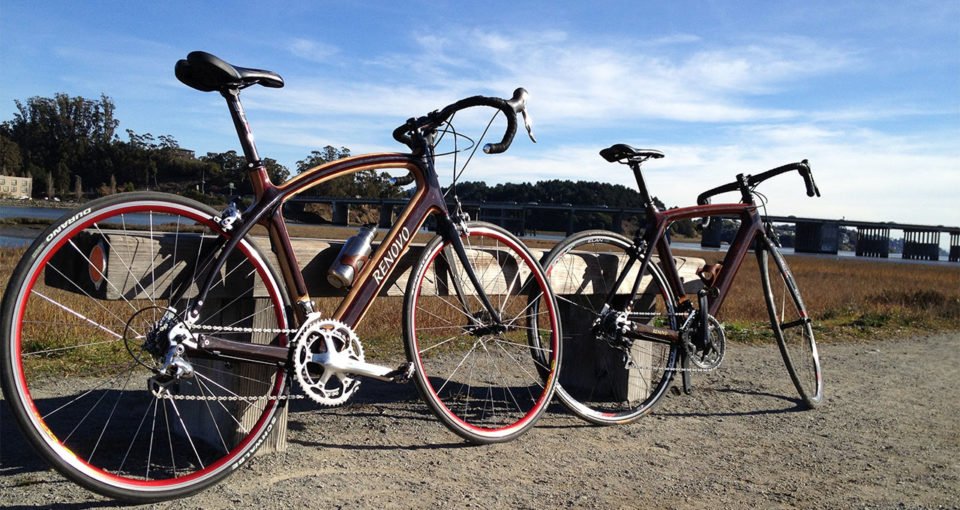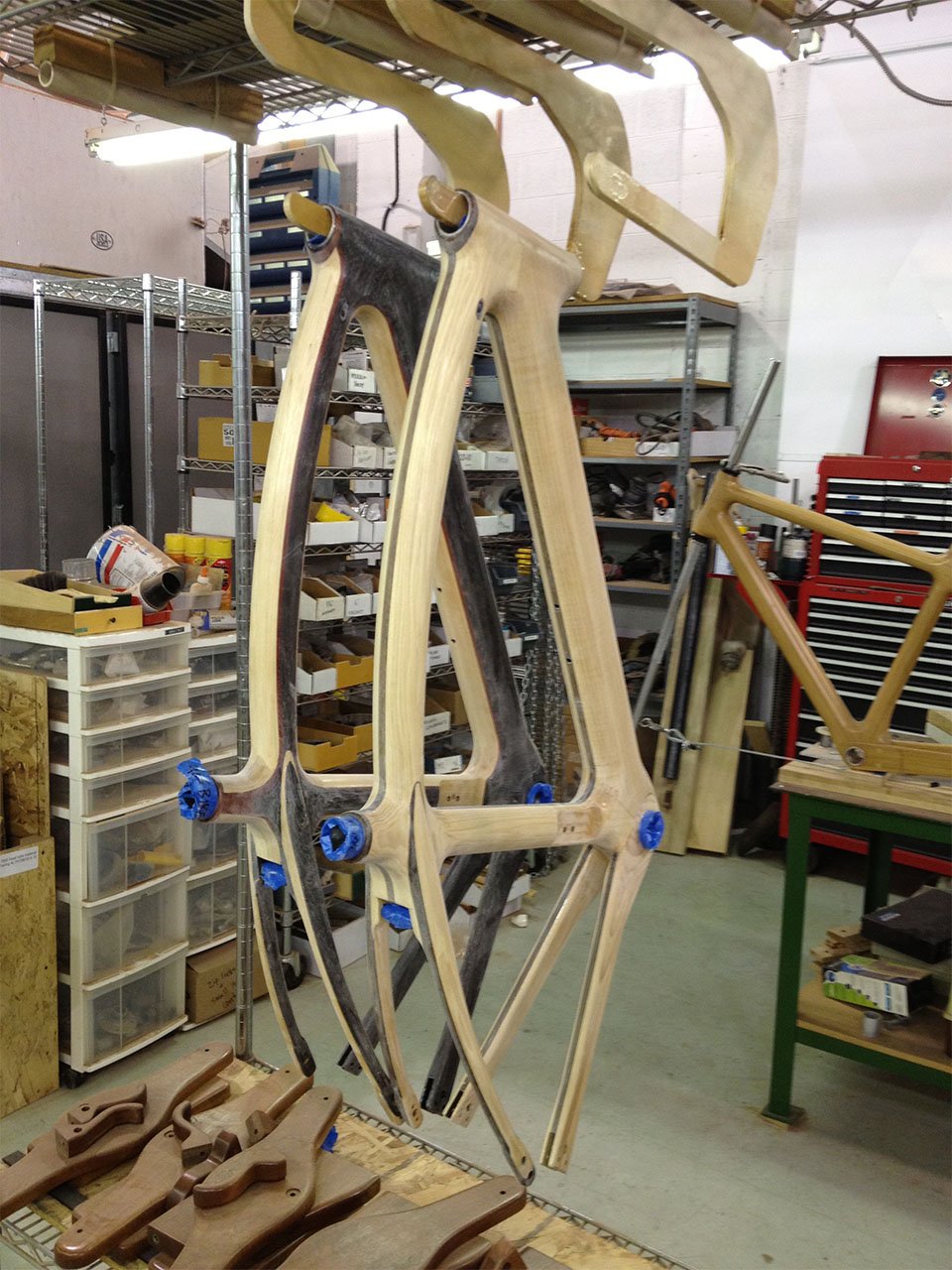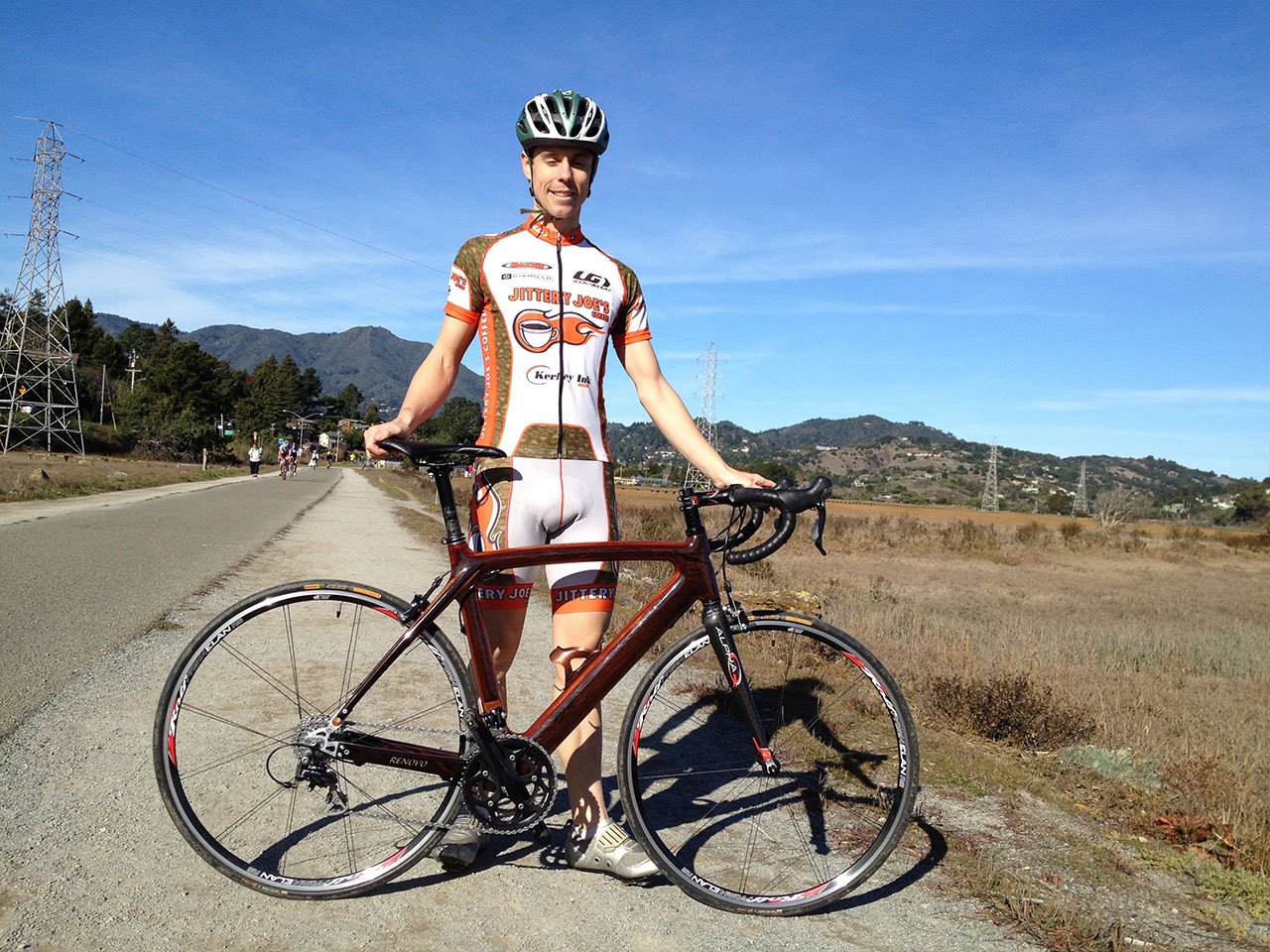Renovo Hardwood Bicycles
Craig Fellers, March 11, 2012

Every year while racing the Sea Otter Classic bike race at Laguna Seca Speedway in Monterey, California, I spend time between races happily perusing the numerous vendor booths. As one of the largest cycling events worldwide, the entire paddock is crammed with pop-up tents where companies ranging from grassroots start-ups to industry giants such as Specialized and Trek come to display their trickest new products for the year.
Over the last few years, it has been impossible to overlook the crowd that can always be found gawking over the beautiful bikes at the Renovo tent. Dodging up to the booth is harder than moving up through the peloton on the bell lap – everybody is fixated on the beautiful Renovo machines. Renovo Hardwood Bicycles has managed to create a marvel somewhere between art and engineering in the manufacturing of their gorgeous wooden bike frames, and they have clearly gained the crowd’s approval.
While nobody could deny how impressive the Renovos looked on the stands, the brand maintains that wood was primarily chosen for its smooth ride quality, impact resistance, and stiffness. They have compensated for wood’s innate plasticity by increasing tube diameter wall thickness, and they claim that their R4 road bike is as stiff, or stiffer, than the Cervelo S2 Soloist depending on the wood that is chosen by the purchaser. Very impressive.
The company is based out of Portland, Oregon and while I was living there this winter, I contacted them to request a factory tour. They very graciously invited me to their factory, or should I call it a workshop, which was located in an unmarked building in the industrial sector of downtown Portland. As soon as the door opens, you are met by the wonderful smell of freshly cut hardwood. A modest collection of Renovo bicycles in the entry demonstrate the progression from their first wood/carbon composite frame which looks fairly crude when compared to the precise curves of today’s Renovo R4 road bike.

It was obvious from the minute I started talking to Nick from Renovo that they were passionate about making top quality bicycles. As much as I wanted to talk about how cool the bikes looked, Nick was equally excited to talk about their performance claiming that they really competed with the best bikes in the industry. They were manufactured to be workhorses rather than trophies. The more I listened, the more wood made sense as a frame material.
We walked through the workshop and watched as a handful of employees lovingly epoxied the lamina of different types of wood together in order to make a frame’s front triangle half ‘blank’ which would then be machine lathed to create the hollow center cutout. After this, the two frame halves would be adhered together and the seat stays were glued in. Finally after the bike was completely laid up, each one is finished and polished by hand while employees paid attention to every detail to bring out the natural colors and textures of the wood being used.
Performance testing
When the process is finished the product is absolutely breathtaking, but how do they actually ride? Given that all bikes are made to order, I was out of luck in Oregon, but Nick put me in touch with the founder of the company Ken who ran a small showroom in Sausalito, CA where I could test ride one of the final products. As these bikes are not sold in any bike shops, I just had to make the trip to ride a Renovo.
A few weeks later I was down standing on the showroom floor talking to Ken, which was an experience in itself. I have never talked to anybody who believed so strongly in their product. Ken explained how he had come from designing boats where he had first started to appreciate the properties of wood. It was not long before we were poring over stress analysis graphs in some text book that I have to admit were completely above my level of understanding.
Basically what I learned was that Ken had done his homework before embarking on his wooden bicycle mission. I could tell that Ken would be more than happy to talk bike design mechanics for hours, but he was equally eager to have me get out and try one of his bikes. I jumped on an R4, gave Ken a wave and was off to enjoy cycling through one of the most scenic places on earth, the Mount Tamalpias watershed.
I was not sure quite what to expect. The bike was made of wood for crying out loud, and I was coming from a high modulus carbon fiber Specialized Tarmac SL4 S-Works which in my opinion is the best race bike ever made. I have ridden a lot of road bikes in my day anywhere from aluminum track bikes to composite road bikes to carbon fiber time trial rigs. As I rolled out of the showroom, my initial impression was very good; the only problem was that I couldn’t keep from looking down at the beautiful frame. I can’t believe I am actually riding this bike! Maybe I am a bit of a bike geek, but I was completely star-struck.
It was kind of like driving your dad’s Super Seven Roadster (hint hint, Dad); you are wondering why anybody would let a college kid like me even touch such a beautiful machine. It definitely turned a lot of heads riding through the plethora of Saturday cyclists in Sausalito. I think I got at least two enthusiastic ‘Nice Bike!’ comments within the first five miles. I could get used to this.
As I pedaled through the city and onto the bike path that meanders up to the base of Mt Tam, I was very pleased with the ride quality. The wooden construction, as one might imagine, was smooth over bumps, dampening vibration and kept you feeling fresh. This would no doubt be a great advantage over the course of a long ride. Anybody around me could clearly tell that I was having the time of my life, and really that is what riding is all about. Wind rushing through my helmet, sun out, cruising at a good clip I couldn’t keep the smile off my face; Renovo seemed like they had completely nailed it.
Then the bike racer in me started to wonder ‘I wonder how a wooden frame will handle under a full throttle sprint,’ I chose an arbitrary point ahead and got out of the saddle and hammered, tossing the bike from left to right trying to eek out every last watt from any muscle in my body that was willing to cooperate. OK, so this is not the stiffest bike on the planet and I don’t think Mark Cavendish is going to trade in his Pinarello for one of these, but it can definitely hang for a shop ride sprint, plus you get the bragging rights that you can outsprint your friends while riding an art project.

As soon as the road turned upwards, you do start to notice the weight. There is nothing a dorky road cyclist likes to do more than complain about weight, and the Renovo frames weigh in at around 4-5 pounds, which is roughly double a new carbon fiber race bike. (Hey, its made of wood with thicker tubes not ultralight carbon fiber, what do you expect?) Even though the bike does not catapult you up the climb, it ascends with a smooth, quiet grace that is uniquely pleasant. As I reached the top of the climb, I was pleased; pleased enjoying the beautiful Marin County landscape, pleased to be out on a gorgeous day in a bike friendly community, and pleased to be riding a bike that represents everything wonderful about the bicycle industry.
Verdict
Renovo is an exceptional company. That is obvious from the moment you type ‘Renovo’ into your Google browser. They are the epitome of dedication and hard work, and have turned a brilliant idea into a product that is not only an eye catching work of art, but an extraordinarily functional machine. Will the bicycle industry ever move towards wooden bike manufacturing? In a word, no. But then again, that is part of what makes Renovo unique and special. They truly imbibe the attitude that anything is possible, and I firmly believe that their thousands of hours of hard work have made the cycling world a better place.
To learn more about how to purchase or test ride a Renovo, go to RenovoBikes.com or visit their showroom in Sausalito, California. Prices depend on components used in the build, but are mostly between 3000-5000 USD. Some used and demo bikes are also available on their website.
Craig Fellers is based out of Santa Cruz where he is the owner and optometrist at Midtown Optometry.